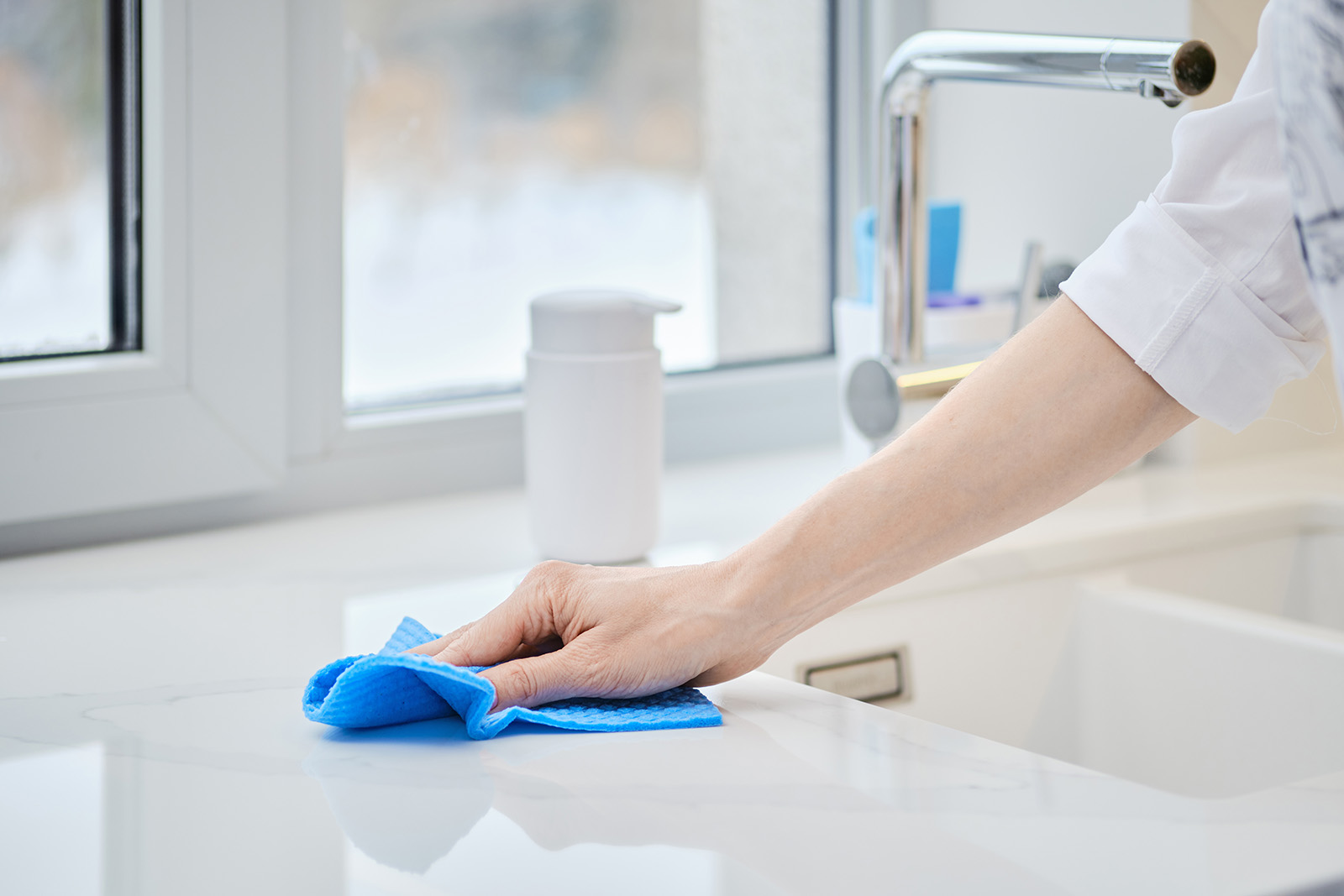Natural stone countertops continue to be the industry gold standard, standing the test of passing times and trends. The beauty of a material straight from the Earth is difficult to beat.
Each slab has a story to tell — the origin of the stone, the selection of the unique name, and the one-of-a-kind pattern in each countertop, bring wonder to your kitchen or bathroom. Natural stone is timeless and holds its value, in addition to bringing full customization to your space.
Best of all, if you follow a few simple rules, your countertops will remain in their best form, for years to come. After all, if they can retain their beauty out in the elements for generations, we can expect the same inside our homes! Marble and granite counters require regular maintenance to protect against the “four Ds” of wear: dirt, deterioration, decay and destruction. If you are hesitating to choose natural stone for your next project, because of the upkeep, keep in mind it’s only a matter of maintaining good habits. Here is a guide to the Four Ds of Natural Stone — we invite you to share this resource with your clients!
Dirt (Cleaning Natural Stone)
To keep your natural stone countertops clean, you generally need only warm water and a sponge or dishrag, to wipe away spills and debris. CleanersAt the end of the day, it’s a good idea to give your countertops a spritz of a cleaner made especially for marble and granite and do a more thorough cleaning – these formulas will disinfect and protect your counters. Method Daily Granite Cleaner or Simple Green Stone Cleaner are safe, non-toxic choices. Once a week, clear your countertops and wipe down the entire surface area and edges with one of these tailor-made cleansers, to keep the surface looking its best. On a monthly basis, you can apply a natural stone polish to the surface to help maintain the shine. Simply Green also carries a Stone Polish.
Deterioration (Scratch Damage)
Be mindful of your marble! The cardinal rule of natural stone is keep the countertops clean and clear of any debris, including sugar or salt, that can get trapped between the surface and heavy items set on the counter. Abrasive grit can cause fine scratches and etches that will dull your stone’s gleam and can compromise its moisture resistance. Remember to use a light hand and soft cleaning supplies (think microfiber towels, rather than abrasive steel wool or other scrubbing tools) for the same reasons.
Once your countertop is clear, always use coasters under glasses, bottles and cans, to prevent fine etching. You may find it helpful to place a dish towel underneath your cutting board — this will both prevent the cutting board from sliding (which is unsafe and could mean a gouge in your counters from that chef’s knife) and provide extra protection from abrasion, from the board itself.
If you find a minor scratch in your surface, don’t worry — mild scratches and scuffs can be buffed or polished away. If you prefer an option that requires less vigilance in scratch prevention, consider a honed or leathered finish for your countertops. These provide a more forgiving surface, that many of the smaller imperfections of regular wear and tear blend into.
Decay (Water Damage)
Marble and, to a lesser extent, granite should be well-sealed, to add an extra layer of protection. Countertops that are not sealed well can absorb oils, spills, and stains. This is especially true of marble, which is a beautiful but porous material, but the same applies to granite, as well. How do you know if your natural stone is properly sealed? Here’s one way to check the seal: drip a little water on the surface and watch how it reacts. If it beads up and stays on the surface after a few minutes, then you have a secure seal; if it slowly soaks into the surface, it’s time to reseal. Generally, marble and granite should be resealed every six to twelve months — just keep an eye on how well the surface deflects moisture.
Sealed countertops will help prevent water damage, but it is a good habit to always wipe up spills immediately, rather than letting them sit. This is particularly important when it comes to acidic substances, like wine, coffee, fruit juice, tomato sauce, and soda.
Destruction (Heat Damage)
Always use a trivet between your hot pots and pans and your countertop. Granite is more heat-resistant than marble, when it comes to radiant heat, but neither should be exposed to direct heat. Again, be mindful in case there is grit on your countertops – the pressure from a heavy pan, in addition to the heat, could cause etching and damage. In addition, if a pot boiled over, or if there was residue on your stove when you started cooking, burnt food could cause staining or burn marks on your countertops, without the protection of a trivet. Build up a collection of attractive trivets, that will have you pulling them out as decor, to help cultivate the habit of protecting your countertops.


